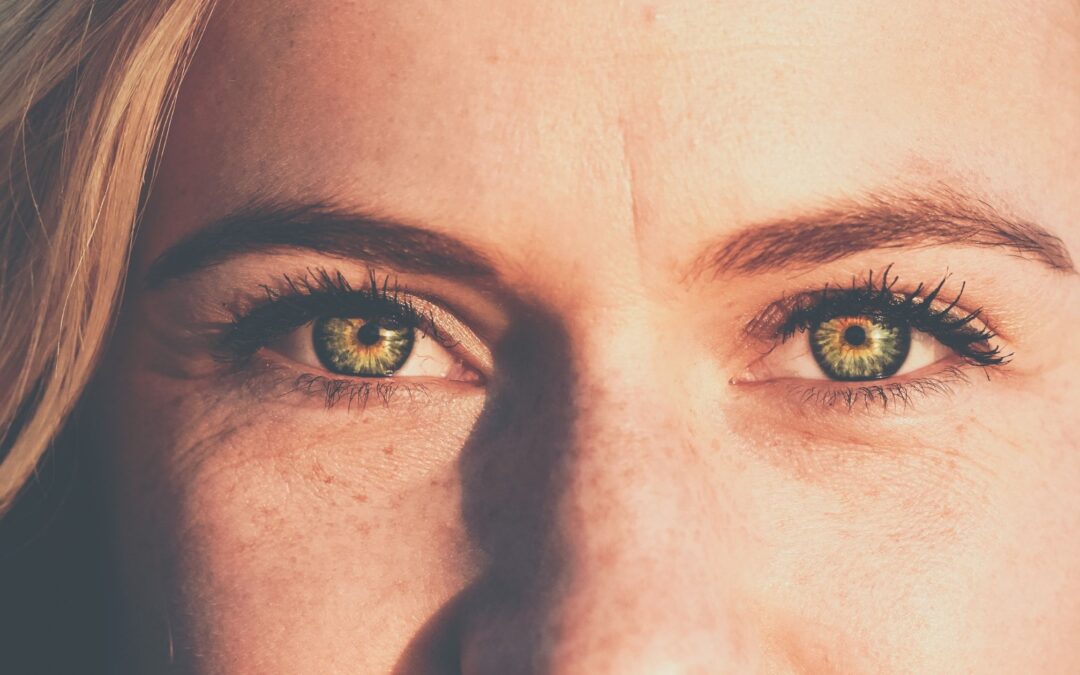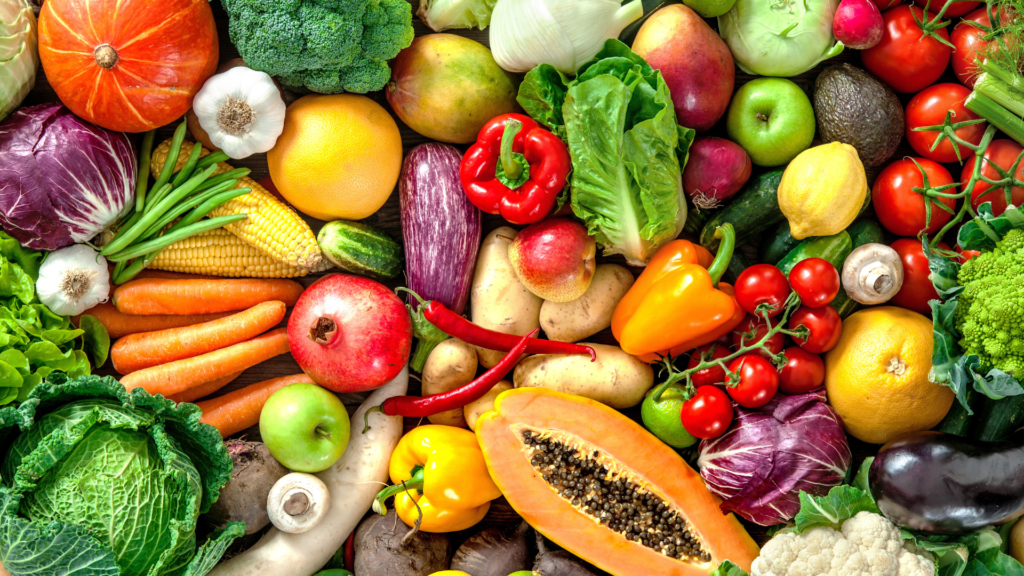
by Joe | Jul 16, 2023 | All about eyes
In the quest for optimal health, we often prioritise aspects like exercise, sleep, and mental well-being. However, one vital component that shouldn’t be overlooked is the impact of our diet on our eyes. Just as a balanced diet is essential for overall well-being, it plays a crucial role in maintaining good eye health. In this article, we will explore the fascinating connection between diet and eye health, and discover which nutrients are essential for promoting and preserving healthy vision.
The Power of Antioxidants
Antioxidants are superheroes when it comes to eye health. They help combat oxidative stress caused by harmful molecules called free radicals, which can damage the cells in our eyes over time. Including antioxidant-rich foods in our diet can help protect our eyes from age-related macular degeneration (AMD), cataracts, and other eye conditions. Some notable antioxidants include:
- Vitamin C: Found abundantly in citrus fruits, berries, and leafy greens, vitamin C aids in reducing the risk of cataracts and slowing the progression of AMD.
- Vitamin E: Almonds, spinach, and sunflower seeds are excellent sources of vitamin E. This nutrient protects our eyes from damage caused by free radicals and may reduce the risk of cataracts and AMD.
- Beta-Carotene: Our bodies convert beta-carotene into vitamin A, which is crucial for maintaining good vision. Carrots, sweet potatoes, and dark leafy greens are rich in beta-carotene and can promote healthy eyes.
Omega-3 Fatty Acids
Omega-3 fatty acids are essential fats that play a significant role in eye health. The two main types of omega-3s found in fish, flaxseeds, chia seeds, and walnuts are docosahexaenoic acid (DHA) and eicosapentaenoic acid (EPA). DHA, specifically, is a major structural component of the retina and is vital for visual development and retinal function. Omega-3s help reduce the risk of dry eyes, macular degeneration, and glaucoma.
Lutein and Zeaxanthin
Lutein and zeaxanthin are two essential carotenoids found in the macula, the central part of the retina responsible for clear and sharp vision. These nutrients act as natural sunscreens, filtering harmful high-energy blue light and protecting the delicate cells in the macula from damage. Green leafy vegetables like spinach and kale, egg yolks, and corn are excellent sources of lutein and zeaxanthin.
Maintaining Stable Blood Sugar Levels
Uncontrolled blood sugar levels can lead to a condition known as diabetic retinopathy, which damages the blood vessels in the retina. To maintain stable blood sugar levels, it is essential to consume a well-balanced diet that includes whole grains, lean proteins, healthy fats, and plenty of fruits and vegetables. Avoiding sugary drinks and processed foods is also crucial in preventing blood sugar spikes that can harm your vision.
Hydration and Eye Health
Staying properly hydrated is essential for overall health, including eye health. Dehydration can cause dry eyes and contribute to eye strain. Ensure you drink an adequate amount of water throughout the day, especially in dry environments or during prolonged screen time.
Diets for Specific Eye Conditions
Tailoring your diet to address specific eye conditions can provide additional support. Here are some diet recommendations for common eye conditions:
Diet for Macular Degeneration
For macular degeneration, incorporate foods rich in omega-3 fatty acids, lutein, zeaxanthin, and antioxidants. Dark leafy greens, fish, and colourful fruits and vegetables should be the foundation of your diet.
Diet for Glaucoma
A diet rich in antioxidants, specifically vitamins C and E, can support eye health in cases of glaucoma. Include citrus fruits, berries, almonds, and sunflower seeds in your daily meals.
Diet for Dry Eyes
Stay hydrated and include foods rich in omega-3 fatty acids, such as fatty fish and flaxseeds. Consuming foods high in vitamin A and vitamin C can also be beneficial.
Diet for Cataracts
To reduce the risk of cataracts, prioritise a diet rich in antioxidants and vitamin C. Colorful fruits and vegetables, especially citrus fruits, can provide the necessary nutrients.
While genetics and age play a role in our eye health, our dietary choices can significantly influence the long-term well-being of our eyes. By incorporating various antioxidant-rich foods, omega-3 fatty acids, lutein and zeaxanthin, and maintaining stable blood sugar levels, we can nourish our eyes and potentially reduce the risk of developing age-related eye conditions. Remember, a balanced diet is not only beneficial for our overall health but also a key ingredient in maintaining healthy vision throughout our lives. So let’s make wise dietary choices and see the world through a clear and vibrant lens!

by Joe | Jun 5, 2023 | All about eyes
When it comes to eye health, there are numerous eye health myths and misconceptions that often cloud our understanding of how to best care for our eyes. In this article, we aim to dispel the most common eye health myths and shed light on the truth, helping you maintain optimal vision and protect your precious eyesight.
Eye Health Myth 1: Sitting too close to the TV or computer screens damages your eyes.
While sitting too close to screens for prolonged periods can cause eye strain and fatigue, it does not permanently damage your eyes. The discomfort experienced is often temporary and can be alleviated by following the 20-20-20 rule: every 20 minutes, take a 20-second break and focus on something 20 feet away.
Eye Health Myth 2: Reading in dim light harms your eyes.
Reading in dim light may strain your eyes and lead to temporary discomfort, but it does not cause any permanent damage. Adequate lighting is important to reduce eye strain and ensure comfortable reading, but it does not affect the long-term health of your eyes.
Eye Health Myth 3: Wearing someone else’s glasses can damage your eyes.
Wearing someone else’s glasses may cause some discomfort or visual distortion, but it does not harm your eyes. However, it is essential to wear glasses prescribed specifically for you to achieve optimal vision correction and prevent unnecessary strain.
Eye Health Myth 4: Eating carrots will significantly improve your vision.
Carrots contain vitamin A, which is crucial for good vision, but consuming excessive amounts of carrots will not give you superhuman eyesight. A balanced diet with a variety of fruits and vegetables, including carrots, can contribute to overall eye health but cannot correct existing vision problems.
Eye Health Myth 5: Squinting worsens your eyesight.
Squinting is a natural response to enhance focus and clarity temporarily. It does not cause any permanent damage or worsen your eyesight. However, if you find yourself frequently squinting, it might be a sign of an underlying vision problem, and it is recommended to schedule an eye examination.
Eye Health Myth 6: Eye exercises can reverse nearsightedness or other vision problems.
While eye exercises can help alleviate eye strain and improve focus, they do not reverse or correct vision problems like nearsightedness, farsightedness, or astigmatism. These conditions are typically caused by the shape of the eye and are best corrected with glasses, contact lenses, or refractive surgeries.
Eye Health Myth 7: Staring at the sun during a solar eclipse is harmless if you squint or wear sunglasses.
Looking directly at the sun, even during an eclipse, can cause severe damage to your eyes, regardless of whether you squint or wear sunglasses. The intense solar radiation can harm the retina, leading to permanent vision loss. Always use certified solar eclipse glasses or indirect viewing methods to protect your eyes.
Eye Health Myth 8: Using artificial tears will make your eyes dependent on them.
Artificial tears are a safe and effective way to relieve dryness and lubricate the eyes. They do not cause dependency or make your eyes “lazy” over time. If you frequently experience dry eyes, it is important to consult an eye care professional to identify and address the underlying cause.
Eye Health Myth 9: Using your eyes too much will ‘wear them out.’
Your eyes are designed to work hard, and they won’t ‘wear out’ if you use them too much. However, it is important to take breaks from using your eyes every 20-30 minutes, to prevent eye strain.
Eye Health Myth 10: Wearing eyeglasses that are too strong or have the wrong prescription will damage your eyes.
Wearing eyeglasses that are too strong or have the wrong prescription will not damage your eyes. However, it can make it difficult to see, and it can also lead to headaches and eye strain.
Eye Health Myth 11: Wearing eyeglasses will weaken your eyes.
Wearing eyeglasses will not weaken your eyes. In fact, it can actually help to strengthen your eyes by providing them with the support they need to focus properly.
Eye Health Myth 12: Crossing your eyes will make them permanently crossed.
This is not always true. In some cases, crossing your eyes can lead to amblyopia, which is a condition where one eye is weaker than the other. However, this is usually only a problem in children. In adults, crossing your eyes will not usually cause any lasting damage.
Eye Health Myth 13: Having 20/20 vision means your eyes are perfectly healthy.
Having 20/20 vision is just one measure of eye health. It does not mean that your eyes are free of any problems. There are many other eye conditions that can affect your vision, even if you have 20/20 vision.
It’s important to remember that these are just myths. There is no scientific evidence to support them. If you have any concerns about your eye health, it’s always best to see an eye doctor.
Here are some additional tips for improving your eye health:
- Get regular eye exams: Regular eye exams are crucial for detecting any potential issues early and maintaining optimal eye health.
- Wear sunglasses when you’re outdoors: Protect your eyes from harmful UV rays by wearing sunglasses that block 100% of both UVA and UVB rays.
- Eat a healthy diet: Include foods rich in antioxidants, omega-3 fatty acids, and vitamins C and E in your diet to support overall eye health. Examples include leafy green vegetables, fish, citrus fruits, and nuts.
- Get enough sleep: Sufficient sleep is essential for eye health and helps prevent eye fatigue and dryness.
- Manage stress: High stress levels can contribute to eye strain and other vision problems. Practice stress management techniques like meditation or deep breathing exercises.
- Quit smoking: Smoking has been linked to an increased risk of various eye conditions, including macular degeneration and cataracts. Quitting smoking can significantly improve your eye health. For help quitting smoking follow this is link.
By following these tips, you can help to keep your eyes healthy and protect your vision for a lifetime. Remember, accurate information and regular eye care are essential for maintaining optimal eye health.





